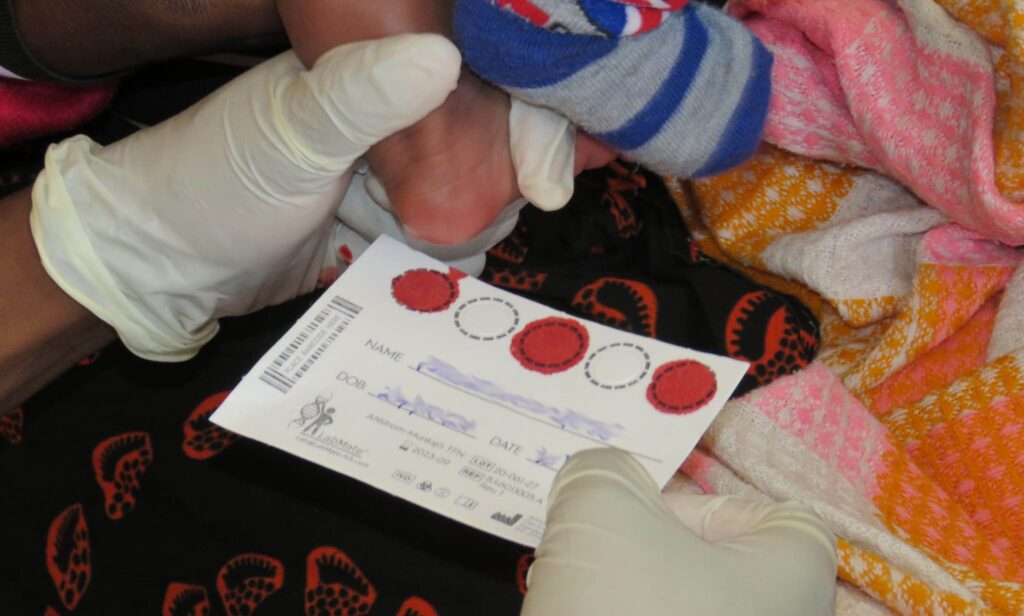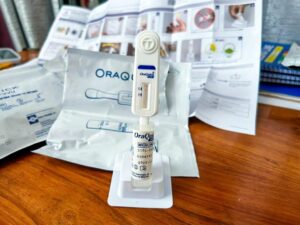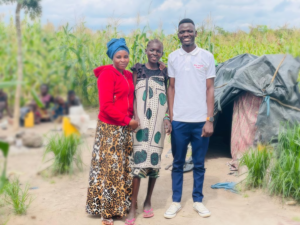By Jesca Sungura.
Dar es Salaam. – Jasmin Abdul, a 33 year old mother discovered that she was pregnant again when her firstborn was 12 years old. As a routine, she went to Mwananyamala Regional Referral Hospital to start antenatal clinic. Little did she know that the routine tests at the clinic will change her life. By the end of her visit, her world seemed to stop, and her life crumbled down.
She had been diagnosed with HIV/AIDS. “When doctors told me that I was HIV positive, I was very shocked and worried thinking about how I’ll be able to live with this condition. If the community knows, how are they going to receive the news? I knew right there my husband will definitely divorce me because of my condition. And I was also worried about how I would take care of my firstborn. I had a lot of questions in my head,” narrated Jasmin.
Fortunately, Jasmin was diagnosed by a healthcare provider trained by Afya Kwanza project which is supported by the US Centers for Disease Control and Prevention (U.S CDC) through Management and Development for Health (MDH). The nurse counseled and informed her of the PMTCT program (Prevention of Mother-To-Child HIV Transmission) which increases the possibility of the child being born HIV-free.
“When I reached home, I hesitated to tell my husband about my condition. I waited two days ahead and that’s when I decided it was time to break the news. When I broke the news to him, he didn’t say anything; it is like he became numb. I thought he was going to divorce me. But he assured me that everything was going to be fine and insisted me not to miss monthly clinic visits” she added.
Jasmin attended the clinic as scheduled, took ART medications and gave birth to a healthy baby and was then enrolled to PMTCT program. She continued to follow instructions and advice given including safer feeding options and she exclusively breastfed her child for 6 months. Prior exit at PMTCT, at 18 months, her child received a final HIV test and was found to be HIV negative. This was a very joyful moment to Jasmine and her husband!!
Vertical transmission of HIV from mother to child is the major contributing factor to morbidity and mortality due to HIV/AIDs in children. Early Infant Diagnosis of HIV facilitates prompt and timely initiation of life-saving treatment for HIV; therefore, WHO recommends that all HIV- exposed infants be tested for HIV by DNA PCR between the age of four to six weeks.
Improved HIV diagnostic methods for infants such as the use of Dried Blood Sampling (DBS) test ensure early diagnosis of HIV, early initiation of antiretroviral treatment and more parents’ acceptance and confidence. DBS test is taken on HIV-exposed infants after birth to check their HIV status. After a prick on the infant’s heel, a drop of blood is collected on sample paper that has five circles then taken to the laboratory for examination where the results would be received within 3 to seven days from the test day.

A healthcare provider conducting the DBS test on a HIV-exposed infant at Mwananyamala Regional Referral Hospital. Photo by Joancen Kagombora, Dar es Salaam.
In 2021, U.S CDC in collaboration with the Ministry of Health Tanzania and MDH commenced the “Tatu Bomba” initiative to improve the quality of DBS sample. In this initiative providers fill three circles instead of five on the DBS sample collection card. This leaves a circle in between samples (as seen on the picture above) hence improving quality by reducing contamination and ensuring sufficient volume.
“If the test turns out to be positive, the mother is called back promptly, counseled for results and for a confirmatory DNA PCR test while the child is initiated with Highly Active AntiRetroviral Therapy (HAART). She will therefore return in the coming month and if the confirmatory test is still positive the mother-baby pair will be transferred to Care and Treatment Clinic (CTC) for more comprehensive client centered services,” she added.
MDH through the funding from U.S CDC, supports DBS testing as part of Maternal and Child Health (MCH) program of Afya Kwanza project. According to DBS program report data of Dar es Salaam region from January 2022 to March 2023, a total of 7,039 HIV- exposed infants who are less than two months were tested, 6,787 tested negative and 48 tested positive out of 6,835 results returned. In the same period at Mwananyamala Regional Referral Hospital, a total of 152 HIV- exposed infants who are less than two months were tested, 148 tested negative and 2 positive out of 150 results returned.
Five years after her diagnosis, Jasmin was pregnant again for her now 4-months old last born. “After I gave birth to my last-born child, I hoped the results will be negative just like on my second born. Immediately after I realized that I was pregnant, I was enrolled in the PMTCT program and continued to follow all the advice given including adhering to my ARVs, after birth I exclusively breastfed my child for six months without mixing with any other food. When my child was six weeks I brought her for the test and the result came negative,” narrated Jasmin. We continued with the PMTCT program up until my child had the final outcome test at 18 months which was also a negative.
DBS testing plays an important role towards achieving the 95-95-95 UNAIDS goal, by facilitating early infant diagnosis of HIV which in turn facilitates early ART initiation and as a result early suppression of viral loads and decreases mortality and morbidity related with HIV. Ensuring quality DBS samples through the “Tatu bomba” initiative that significantly reduces DBS rejection has proven to be critical.
Edited by Kuduishe Kisowile.



